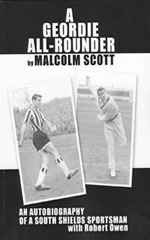A Geordie All-Rounder
Martin Chandler |Published: 2009
Pages: 143
Author: Scott, Malcolm
Publisher: Write Good Publishing
Rating: 4 stars

Malcolm Scott was one of the fortunate few who, in the days when it was possible to do so, played County Cricket in the summer and First Division football in the winter. He did not reach the very top of either sport, and his name is not one which will be recognised by many, but his autobiography, published in the autumn of his life, is a fascinating story and a timely reminder of just how recently the life of a professional sportsman has become the cosseted and privileged existence that it is today.
Scott was born in South Shields, an industrial town on the mouth of the River Tyne, in 1936. His was an unremarkable, but happy wartime childhood in which he demonstrated no great ability as a scholar but showed considerable sporting potential. One of the more appealing aspects of his story is that it takes its time dealing with his childhood and his sporting upbringing and, as it concludes, his life after sport.
After leaving school Scott underwent a full five year apprenticeship at the local shipyard before then carrying out his national service, those two factors combining to mean it was the late 1950’s, and his early 20’s, before he could make sport his occupation.
As a cricketer Scott was primarily an orthodox slow left arm bowler, but also a useful lower order batsman. He played for Northamptonshire, traditionally one of the weakest counties but who, during his time with them, enjoyed considerable success famously coming within just four points of winning the County Championship in 1965. In his twelve seasons with the county 1964 was the one year that Scott managed over 100 wickets, but he made a considerable contribution to the success of the following season and, over his career, he took his 461 wickets at the thoroughly respectable cost of 24 runs each. He left the game at the end of the 1969 season. He was only 33 but his employers seemed not to consider him a man for the one day game and he certainly seemed to have fallen out of love with the game somewhat as a result of the way he was treated when his bowling action was the subject of some criticism in 1967.
As a footballer Scott played first for the local giants, Newcastle United. He only played 26 competitive matches for the first team in four years before moving down the Divisions to neighbours Darlington, and then York City, before dropping out of the Football League and into non-league football by the time he was 28. The only thing, having finished the book, that I have to say I don’t completely understand is just why, given what the newspapers said about his football, that Scott’s career followed the path that it did as he was clearly considered, by the press at least, to be an outstanding prospect. I suspect he may have lacked that streak of ruthlessness necessary to get to the highest levels in sport – certainly he does not appear to have lacked the talent.
Malcolm Scott, like all of us, no doubt had his unhappy times, and he makes mention of one or two of them, particularly the issue over his bowling action, but the most striking feature of this book is that what comes across loud and clear is just how much he has enjoyed his life. It is understandable, but not particulary interesting, the way those of Scott’s generation often feel resentful of the financial rewards that come the way of the current generation but there is no hint of that here.
There must be many with stories to tell as interesting as Malcolm Scott who, due to the need of major publishing houses to make profits for their shareholders, never get the opportunity to go into print. It is one of the benefits of technology that small publishers such as Write Good Books can plug the gap. The production standards of the book could be better, and I suspect it was not proof read by someone with a knowledge of the game but, at the end of the day, it is the quality of the content that counts and this will appeal to anyone with an interest in the 1950’s and the 1960’s.






Leave a comment